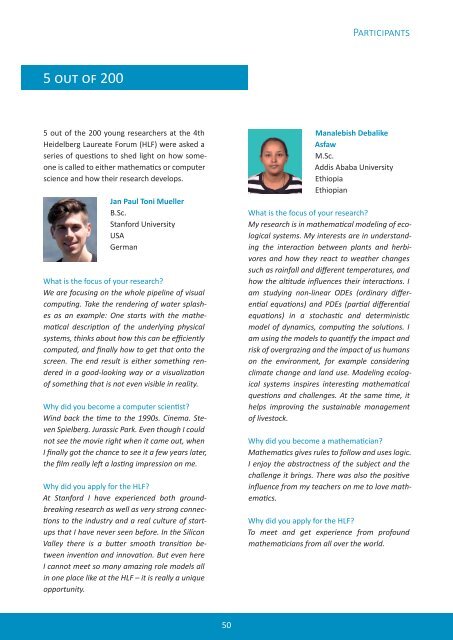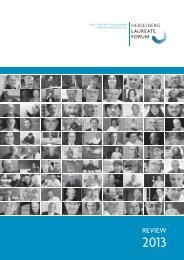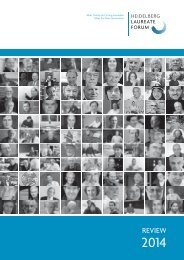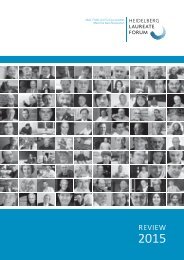HLF Review 2016
Create successful ePaper yourself
Turn your PDF publications into a flip-book with our unique Google optimized e-Paper software.
Participants<br />
5 out of 200<br />
5 out of the 200 young researchers at the 4th<br />
Heidelberg Laureate Forum (<strong>HLF</strong>) were asked a<br />
series of questions to shed light on how someone<br />
is called to either mathematics or computer<br />
science and how their research develops.<br />
Jan Paul Toni Mueller<br />
B.Sc.<br />
Stanford University<br />
USA<br />
German<br />
What is the focus of your research?<br />
We are focusing on the whole pipeline of visual<br />
computing. Take the rendering of water splashes<br />
as an example: One starts with the mathematical<br />
description of the underlying physical<br />
systems, thinks about how this can be efficiently<br />
computed, and finally how to get that onto the<br />
screen. The end result is either something rendered<br />
in a good-looking way or a visualization<br />
of something that is not even visible in reality.<br />
Why did you become a computer scientist?<br />
Wind back the time to the 1990s. Cinema. Steven<br />
Spielberg. Jurassic Park. Even though I could<br />
not see the movie right when it came out, when<br />
I finally got the chance to see it a few years later,<br />
the film really left a lasting impression on me.<br />
Why did you apply for the <strong>HLF</strong>?<br />
At Stanford I have experienced both groundbreaking<br />
research as well as very strong connections<br />
to the industry and a real culture of startups<br />
that I have never seen before. In the Silicon<br />
Valley there is a butter smooth transition between<br />
invention and innovation. But even here<br />
I cannot meet so many amazing role models all<br />
in one place like at the <strong>HLF</strong> – it is really a unique<br />
opportunity.<br />
Manalebish Debalike<br />
Asfaw<br />
M.Sc.<br />
Addis Ababa University<br />
Ethiopia<br />
Ethiopian<br />
What is the focus of your research?<br />
My research is in mathematical modeling of ecological<br />
systems. My interests are in understanding<br />
the interaction between plants and herbivores<br />
and how they react to weather changes<br />
such as rainfall and different temperatures, and<br />
how the altitude influences their interactions. I<br />
am studying non-linear ODEs (ordinary differential<br />
equations) and PDEs (partial differential<br />
equations) in a stochastic and deterministic<br />
model of dynamics, computing the solutions. I<br />
am using the models to quantify the impact and<br />
risk of overgrazing and the impact of us humans<br />
on the environment, for example considering<br />
climate change and land use. Modeling ecological<br />
systems inspires interesting mathematical<br />
questions and challenges. At the same time, it<br />
helps improving the sustainable management<br />
of livestock.<br />
Why did you become a mathematician?<br />
Mathematics gives rules to follow and uses logic.<br />
I enjoy the abstractness of the subject and the<br />
challenge it brings. There was also the positive<br />
influence from my teachers on me to love mathematics.<br />
Why did you apply for the <strong>HLF</strong>?<br />
To meet and get experience from profound<br />
mathematicians from all over the world.<br />
50






